英语主语从句分类与解析paper版
- 格式:doc
- 大小:40.00 KB
- 文档页数:4
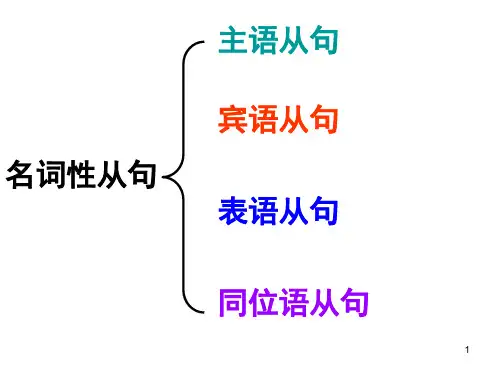
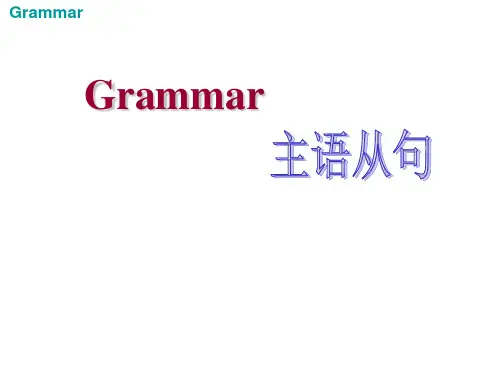
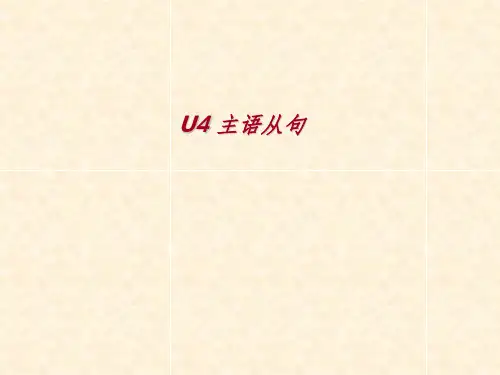
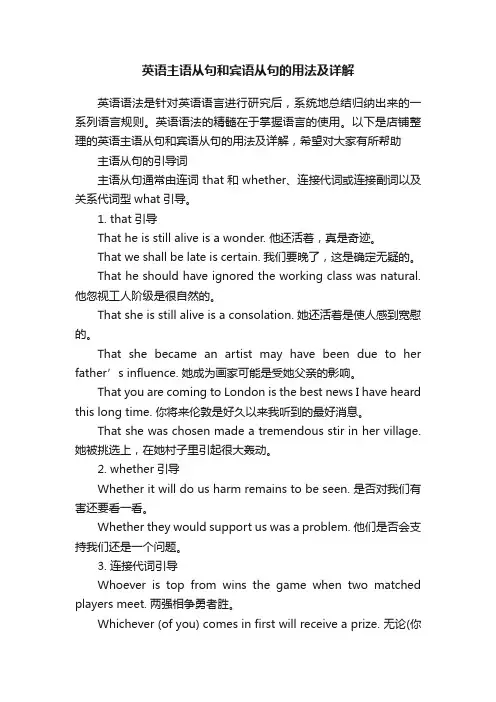
英语主语从句和宾语从句的用法及详解英语语法是针对英语语言进行研究后,系统地总结归纳出来的一系列语言规则。
英语语法的精髓在于掌握语言的使用。
以下是店铺整理的英语主语从句和宾语从句的用法及详解,希望对大家有所帮助主语从句的引导词主语从句通常由连词that和whether、连接代词或连接副词以及关系代词型what引导。
1. that引导That he is still alive is a wonder. 他还活着,真是奇迹。
That we shall be late is certain. 我们要晚了,这是确定无疑的。
That he should have ignored the working class was natural. 他忽视工人阶级是很自然的。
That she is still alive is a consolation. 她还活着是使人感到宽慰的。
That she became an artist may have been due to her father’s influence. 她成为画家可能是受她父亲的影响。
That you are coming to London is the best news I have heard this long time. 你将来伦敦是好久以来我听到的最好消息。
That she was chosen made a tremendous stir in her village. 她被挑选上,在她村子里引起很大轰动。
2. whether引导Whether it will do us harm remains to be seen. 是否对我们有害还要看一看。
Whether they would support us was a problem. 他们是否会支持我们还是一个问题。
3. 连接代词引导Whoever is top from wins the game when two matched players meet. 两强相争勇者胜。
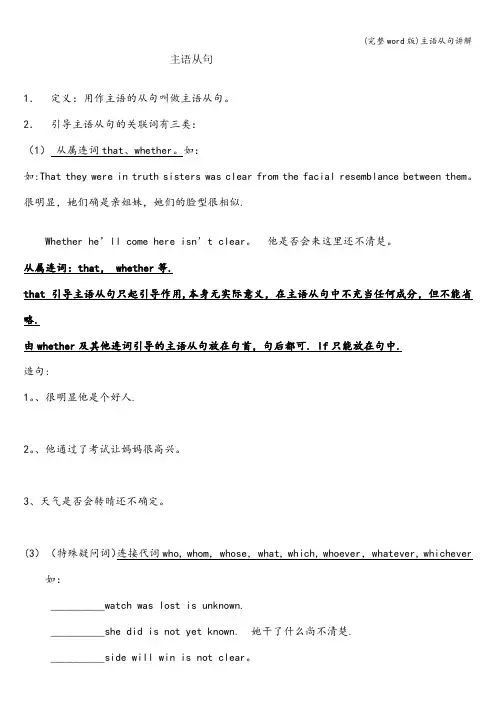
主语从句1.定义:用作主语的从句叫做主语从句。
2.引导主语从句的关联词有三类:(1)从属连词that、whether。
如:如:That they were in truth sisters was clear from the facial resemblance between them。
很明显,她们确是亲姐妹,她们的脸型很相似.Whether he’ll come here isn’t clear。
他是否会来这里还不清楚。
从属连词:that, whether等.that 引导主语从句只起引导作用,本身无实际意义,在主语从句中不充当任何成分,但不能省略.由whether及其他连词引导的主语从句放在句首,句后都可. If只能放在句中.造句:1。
、很明显他是个好人.2。
、他通过了考试让妈妈很高兴。
3、天气是否会转晴还不确定。
(3)(特殊疑问词)连接代词who, whom, whose, what, which, whoever, whatever, whichever 如:__________watch was lost is unknown.__________she did is not yet known. 她干了什么尚不清楚.__________side will win is not clear。
__________comes is welcome。
不论谁来都欢迎。
__________ was said has left us much to think。
这里说的话都应当保密.造句:1. 我们需要的是时间。
2。
谁将成为我们的班长还没有决定。
3。
哪本书更好还不知道。
(4) (特殊疑问词)连接副词 where, when, how, why,wherever,whenever,however。
___________ he did it remains a mystery.When they will start is not known yet.How this happened is not clear to anyone。
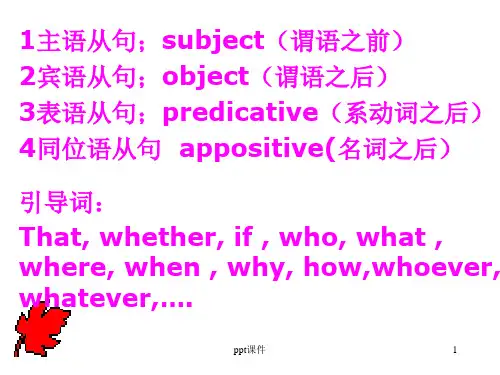

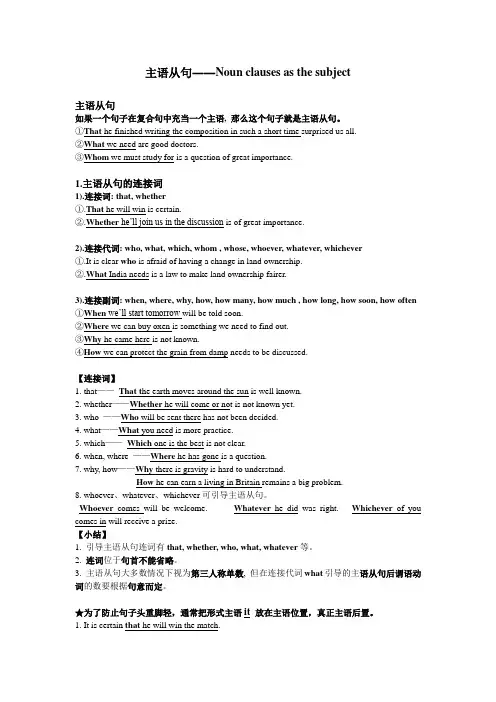
主语从句——Noun clauses as the subject主语从句如果一个句子在复合句中充当一个主语, 那么这个句子就是主语从句。
①That he finished writing the composition in such a short time surprised us all.②What we need are good doctors.③Whom we must study for is a question of great importance.1.主语从句的连接词1).连接词: that, whether①.That he will win is certain.②.Whether he’ll join us in the discussion is of great importance.2).连接代词: who, what, which, whom , whose, whoever, whatever, whichever①.It is clear who is afraid of having a change in land ownership.②.What India needs is a law to make land ownership fairer.3).连接副词: when, where, why, how, how many, how much , how long, how soon, how often①When we’ll start tomorrow will be told soon.②Where we can buy oxen is something we need to find out.③Why he came here is not known.④How we can protect the grain from damp needs to be discussed.【连接词】1. that——That t he earth moves around the sun is well known.2. whether——Whether he will come or not is not known yet.3. who ——Who will be sent there has not been decided.4. what——What you need is more practice.5. which——Which one is the best is not clear.6. when, where ——Where he has gone is a question.7. why, how——Why there is gravity is hard to understand.How he can earn a living in Britain remains a big problem.8. whoever、whatever、whichever可引导主语从句。
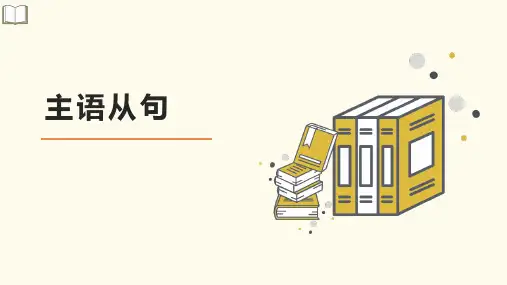
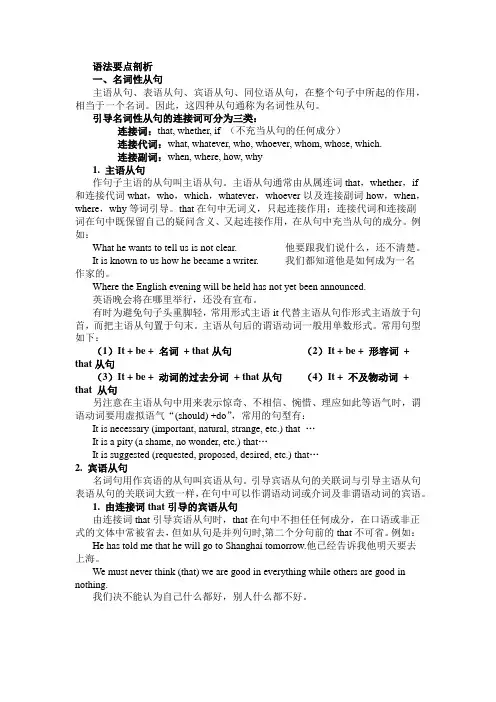
语法要点剖析一、名词性从句主语从句、表语从句、宾语从句、同位语从句,在整个句子中所起的作用,相当于一个名词。
因此,这四种从句通称为名词性从句。
引导名词性从句的连接词可分为三类:连接词:that, whether, if (不充当从句的任何成分)连接代词:what, whatever, who, whoever, whom, whose, which.连接副词:when, where, how, why1. 主语从句作句子主语的从句叫主语从句。
主语从句通常由从属连词that,whether,if和连接代词what,who,which,whatever,whoever以及连接副词how,when,where,why等词引导。
that在句中无词义,只起连接作用;连接代词和连接副词在句中既保留自己的疑问含义、又起连接作用,在从句中充当从句的成分。
例如:What he wants to tell us is not clear. 他要跟我们说什么,还不清楚。
It is known to us how he became a writer. 我们都知道他是如何成为一名作家的。
Where the English evening will be held has not yet been announced.英语晚会将在哪里举行,还没有宣布。
有时为避免句子头重脚轻,常用形式主语it代替主语从句作形式主语放于句首,而把主语从句置于句末。
主语从句后的谓语动词一般用单数形式。
常用句型如下:(1)It + be + 名词+ that从句(2)It + be + 形容词+ that从句(3)It + be + 动词的过去分词+ that从句(4)It + 不及物动词+ that 从句另注意在主语从句中用来表示惊奇、不相信、惋惜、理应如此等语气时,谓语动词要用虚拟语气“(should) +do”,常用的句型有:It is necessary (important, natural, strange, etc.) that …It is a pity (a shame, no wonder, etc.) that…It is suggested (requested, proposed, desired, etc.) that…2. 宾语从句名词句用作宾语的从句叫宾语从句。

(完整版)主语从句详解主语从句详解一、概述在句子中起名词作用的各种从句统称为名词性从句.根据它们在句中的语法作用, 这类从句又可分为主语从句、同位语从句、表语从句和宾语从句.二、主语从句主要有四类(1)由连词that引导的主语从句:引导词that无含义/在句中不做成分/不可以省.例如:That you will win the medal seems unlikely.That you are so indifferent bothers me.That she survived the accident is a miracle.(2)用连词whether 引导的主语从句: whether有含义(是否)/在句中不做成分/不可以省. 注意:引导主语从句, 不能用if, 只能用whether.例如:Whether we will hold a party in the open air tomorrow depends on the weather.Whether she is coming or not doesn’t matt er too much.(3)用连接代词引导的主语从句在由连接代词who, whose, whom, which, what, whoever, whomever, whichever, whatever引导的名词性从句中,其连接代词在句中起名词性作用, 担当一定成分.例如:What you need is more practice. What I want to know is this.Whatever we do is to serve the people.注:whatever / whoever的功用whatever, whoever在主语从句中不含疑问意义.它引导主语从句, 并在从句中作主语、宾语、表语等.whatever = anything that; whoever = anyone who.要注意和whatever, whoever引导的让步状语从句的区别.Whoever breaks the law should be punished. (主语从句)(=Anyone who breaks the law should be punished. )Whoever breaks the law, he should be punished. (让步状语从句)(=No matter who breaks the law, he should be punished. )(4)用连接副词when, where, why, how引导名词性从句(其连接副词有含义,在句中作状语.) 例如:Where we should leave it is a problem.When they will come hasn’t been made pubic.三、注意点: it构成的主语从句(1)由连词that引导的主语从句, 在多数情况下放到句子的后面, 而用代词it作形式主语. 例如:That light travels in straight lines is known to all.=It is known to all that light travels in straight lines.When the plane is to take off has not been announced .= It has not been announced when the plane is to take off.(但当what引导的主语从句表示“…的东西”时, 一般不用it作形式主语.)错:It is a book what he wants.对:What he wants is a book.另外, 需要注意的是, it作形式主语代替主语从句时, 要注意和as引导的定语从句的区别.试比较:It was reported that the US was under the terrorist attack.As was reported, the US was under the terrorist attack.(2)常见用it作形式主语的复合句结构A. It is +名词+从句It is a fact that… 事实是……It is good news that … ……是好消息It is a question that … ……是个问题It is common knowledge that … ……是常识类似的名词还有:a pity;a wonder;a good thing;no wonder;surprise等.例如:It is a mystery to me how it all happened.It is common knowledge that the whale is not a fish.It is no surprise that Bob should have won the game.It’s a pity that you missed the film.B. It is +形容词+从句It is necessary that … 有必要……It is clear that … 很清楚……It is likely that … 很可能……It is important that … 重要的是……类似的形容词还有:Strange; natural; obvious; true; good; wonderful; possible; unlikely; quite; unusual; certain; evident; worth-while; surprising; interesting; astonishing, etc.例如:It is doubtful whether she will be able to come.It was really astonishing that he refused to talk to you.It is essential that he should be here by the weekend.It seems obvious that we cannot go on like this.It is necessary that you (should)master the computer.It is important that a student learn English well.It is likely that a hurricane will arrive soon.需要注意的是, 这类主语从句中, 谓语动词很多为“(should)+动词原形”, 即要用虚拟语气.C. It is +过去分词+从句It is said that … 据说……It is reported that … 据报道……It has been proved that … 已证明……It must be pro ved that… 必须指出……类似的过去分词还有:known; estimated; expected; believed;thought; hoped; noted; discussed; required;decided; suggested; demanded; made clear; found out,etc.例如:It is thought that he is the best player.It is estimated that the vase is 2000 years old.It is used to be thought that a new star must be due to a collision between two stars.It has not been made clear when the new road is to be opened to traffic.It is said that he was killed in the earthquake.D. It seems(happened / appears / doesn’t matter / makes no difference / occurred …)that …It seems that they will win the game.It makes no difference whether he will attend the meeting or not.It does not matter if I missed my train.It happened that I saw him yesterday.主从练习1. _____ as much as one-fifth of all timber harvested is not used.A. The estimateB. The estimatedC. They are estimatedD. It is estimated that2. _____ some mammals came to live in the sea is not known.A. WhichB. SinceC. AlthoughD. How3. _____ we have achieved is attributed to the guidance of our parents.A. WhoeverB. WhateverC. HoweverD. That4. _____ wealthy does not necessarily mean that a man is greedy.A. For the reason that he isB. Just because he isC. The reason of beingD. That he is5. Although ___ happened in this developed country sounds like science fiction, it could occur elsewhere in the world.A. whichB. whatC. howD. it6. _____ she had forgotten to take her notebook.A. That occurred to herB. She occurred thatC. To her that occurredD. It occurred to her that7. I am sure that _____ she said is wrong.A. whichB. allC. thisD. what8. We lost our way in the forest, and ____ made matters worse was that it was getting dark.A. thatB. whichC. itD. What9. _____ or not is still uncertain.A. He’s comingB. If he is comingC. That comingD. Whether he’s coming10. It’s _____ he’ll be able to come.A. doubt whetherB. doubtfulC. doubt itD. doubtful whether11. ______ he is at work in the heart of the big city or at home in the quiet suburb, Dick’s l ife is tied to machines.A. WhetherB. TillC. IfD. Unless12. _____ he saw both surprised and frightened him.A. ThatB. WhenC. WhatD. Which13. _____ is warm sunshine.A. What do we all need.B. What all we needC. What we needD. What we all need14. _____ is a pity that he should feel so upset.A. WhatC. HeD. It15. _____ a spoonful of soil can tell us so much about the structure and early history of the moon.A. RemarkableB. Quite remarkablyC. It is remarkable thatD. It is remarkable fact that16. _____ you nominate will be elected.A. WhoB. WhomC. WhomeverD. That’s17. _____ book you borrow must be returned within a week.A. WhatB. WhichC. WhicheverD. That’s18. _____ of us gets home first starts cooking.A. WhoB. WhichC. WhicheverD. Anyone1.________ makes mistakes must correct them.A. WhatB. ThatC. WhoeverD. Whatever2. It worried her a bit ____ her hair was turning grey.B. thatC. ifD. for3.When and why he came here ________ yet.A. is not knownB. are not knownC. has not knownD. have not known4. ________ is no reason for dismissing her.A. Because she was a few minutes lateB. Owing to a few minutes lateC. The fact that she was a few minutes lateD. Being a few minutes late5. ________ Tom liked to eat was different from ________.A. That…that you had expectedB. What …that you had expectedC. That…what you had expectedD. What…what you had expected6.________ we go swimming every day ________ us a lot of good.A. If...doB. That...doC. If...doesD. That...does7.It ________ Bob drives badly.A. thinks thatB. is thought whatC. thought thatD. is thought that8.It's uncertain ________ the experiment is worth doing.A. ifB. thatC. whetherD. how9.________ the boy didn't take medicine made his mother angry.A. ThatB. WhatC. HowD. Which10.____ we can't get seems better than ____ we have.A. What, whatB. What, thatC. That, thatD. That, what11.____ you don't like him is none of my business.A. WhatB. WhoC. ThatD. Whether12..____ we'll go camping tomorrow depends on the weather.A. IfB. WhetherC. ThatD. Where13._________is going to do the job will be decided by the Party committee.A. ThatB. WhyC. HowD. Who14._______we'll finish translating the book depends on the time.A. WhenB. WhyC. WhatD. That15.______he won't go there is clear to all of us.A. HowB. WhatC. WhyD. This16.______the house will be built will be discussed at tomorrow's meeting.A. IfB. WhereC. ThatD. What17._______you come or not is up to you.A. WhatB. IfC. WhyD. Whether18._______makes mistakes must correct them.A. WhoB. AnyoneC. WhoeverD. Anybody19._______team will win the match is a matter of public concern.A. WhichB. ThatC. IfD. How20. Who is this factory __________ some foreign friends visited last Friday?A. thatB. whereC. whichD. the one21.Is this factory you visited the other day?A. thatB. whereC. in whichD. the one22.________leaves the room last ought to turn off the lights.A. AnyoneB. The personC. WhoeverD.Who表语从句1、概述用作表语的从句叫作表语从句, 它位于主句中的连系动词之后.引导表语从句的词有从属连词that、whether、as though(if);关系代词who, what, which, whom, whose, whatever, whoever, whomever, whichever等;关系副词when, where, why, how, however, whenever, wherever等.可以接表语从句的连系动词由be, look, remain, seem等.That引导表语从句时, 在口语中, 间或可以省略.The trouble is that we are short of money.困难是我们资金短缺.That is why stone walls are used instead of fences aroundNew England fields.这就是为什么在新英格兰用石头墙而不用栅栏的原因.At that time, it seemed as if I couldn't think of the right word anyhow.当时,我似乎怎么也想不出一个恰当的字眼来.2、由从属连词that, whether引导的表语从句.that在引导表语从句时无词义, 而whether有词义, 意为、“是否”.这时主句的主语常常是些抽象名词, 如question(问题), trouble(麻烦), problem(问题), result(结果), chance(可能性), suggestion(建议), idea(想法), reason(理由)等.表语从句对主句主语进行说明、解释, 使主语的内容具体化.The trouble is (that) she has lost his money. 麻烦的事是他丢了钱.The question is whether we need more ice cream.问题是我们是否还需要一些冰淇淋.The problem was that it was too valuable for everyday use.问题是它作为日常之用太贵重了. What she couldn’t understand was that fewer and fewer students showed interest in her l essons. 我们不能理解越来越少的学生对他的课不感兴趣.3、由关系代词引导的表语从句.关系代词who, what, which, whom, whose, whatever, whoever, whomever, whichever等引导表语从句, 在句中作主语、宾语、表语, 关系代词不能省略.The question is which of us should go.问题是我们哪一个应该去.The problem was who could do the work.问题是谁能做这项工作.That's what he is worrying about.那就是他在担心的事.That's what we should do.那是我们应该做的.4、由关系副词引导的表语从句.Go and get your coat. It's where you left it. 去把雨衣拿来.就在你原来放的地方.I had nei ther a raincoat nor an umbrella. That’s why I got wet through. 我们既没伞也没雨衣, 这是我们淋湿的原因.That is how mice ruin many stores of grain every year.那就是老鼠是怎样每年损害大量粮食的. That is what he is worried about.那就是他所担心的.5、由连词because, as if/as though等引导的表语从句.It looked as if it was going to snow.看起来好像要下雪了.That's because we never thought of it.这是因为我们从未想过此事.It see ms as if he didn’t know the answer.好像他不知道答案.可以接表语从句的系动词有:1:be(being,been,am,is,are,was,were)2: feel , seem , look, appear ,sound,taste , smell3: stand , lie , remain ,keep, stay4: become ,get , grow , turn ,go ,come, run,fall5: prove, turn out系动词的固定搭配:come true, fall asleep, fall ill, go bad, come right, run wild连接词:that / whether /as if /asthough (if不引导表语从句)连接代词:who / whom / whose / which/ what连接副词:when / where / why / how /because注:引导表语从句的连词that间或可以省略.The truth is(that)I didn't go there. 事实是我没去那儿.[考题1]The traditional view is ____ we sleep because ourbrain is “programmed” to make us do so.A. whenB. whyC. whetherD. that[答案] D[解析]下划线处之后是包含一个原因状语从句的表语从句, 如果看不出它是充当整个句子结构的表语从句将难以把握整个句子的意思.因此, 应选择可引导名词性从句且不充当任何成分的that.[考题2]You are saying that everyone should be equal, and this is ____ I disagree.A. whyB. whereC. whatD. how[答案] B[解析]下划线处的引导词引导系动词is后的表语从句并在该表语从句中充当地点状语(“disagree”属于不及物动词, “I disagree”本身是完整的主谓结构), 下划线应填入引导词where, 表语从句“where I disagree”的意思是“我不同意之处、我不同意的地方”.[考题3]— I drove to Zhuhai for the air show last week.— Is that ____ you had a few days off?A. whyB. whenC. whatD. where[答案] A[解析]下划线处的引导词引导与系动词is连用的表语从句并在该表语从句中充当原因状语, 下划线应填入表示“因此……”(指因某种原因所造成的结果)的引导词why.[考题4]____ she couldn’t understand was ____ fewer and fewer students showed interest in her lessons.A. What; whyB. That; whatC. What; becauseD. Why; that[答案] A[解析]第一个下划线处的引导词引导主语从句并在该主语从句中充当宾语, 特指她所不理解的事情, 应填入关系代词型的引导词what;第二个下划线处表示“因此……”(指因某种原因所造成的后果, 由why 引导对应的名词性从句)而不是“为什么……”(指原因、理由, 由because引导对应的名词性从句), 应填入引导词why.[考题5]____ made the school proud was ____ more than 90% of the students had been admitted to key universities.A. What; becauseB. What; thatC. That; whatD. That; because[答案] B[解析]第一个下划线处的引导词引导主语从句并在该主语从句中充当主语, 特指令校方骄傲的事情, 应选用关系代词型的引导词what;第二个下划线处引导表语从句表示原因、理由, 应由that引导对应的名词性从句.[考题6]—Are you still thinking about yesterday’s game?—Oh, that’s ____.A. what makes me feel excitedB. whatever I feel excited aboutC. how I feel about itD. when I feel excited[答案] A[解析]A选项的意思是“令我感觉激动的事物”;B选项的意思是“我觉得激动的任何事物”;C选项的意思是“我对它感觉的方式”;D选项的意思是“令我感觉激动的时间”.四个选项中A最适合跟代表“game”的主语that对应, 充当表语从句.表语从句与宾语从句的关系不属于的宾语从句和表语从句都属于名词性从句.其作用跟名词在句中的作用相同.故充当宾语的句子叫宾语从句, 充当表语的句子叫表语从句.宾语从句(1)对于宾语从句要掌握以下三点①语序: 从句的语序必须是陈述句语序, 即“主语+ 谓语”这种形式.②时态: 当主句是一般现在时或一般将来时的时候, 从句可以是任何时态, 而当主句是一般过去时的时候, 从句, 从句时态必须是过去时范围的时态, 即(一般过去时, 过去进行时, 过去完成时, 过去将来时).③连接词: 当从句意思完整, 主句意思肯定时, 连接词用that, 且可以省去, 当从句意思完整, 主句意思不确定或含否定含意时, 常用if或whether(是否), 当从句意思不完整时, 连接词则是代替不完整部分的特殊疑问词.表语从句在句子中起表语作用的从句叫做表语从句, 位于主句系动词的后面.表语从句的引导词和主语从句的引导词相同.也是名词性从句的一种.如:What the police want to know is when you enred red the room警察想知道的是你什么时候进的房间.The The trouble is that we are short of funds困难是我们缺乏资金.This This is what we should do这是我们应当做的.That”s s why I want you to work there那就是我要你在那儿工作的原因.His His first question was whether Mr. Smith had arrived yet 他的第一个问题是史密斯先生到了没有.注意:从句中的疑问句用正常语序, 即陈述语序.as as if, as though, becau也可用来引导表语从句.She She seems as if she had done a great thing她看起来好像做了一件大事.It It is because you eat too much那是因为你吃得太多了.表从练习一1. The question is ________ we will have our sports meet next week.A. thatB. ifC. whenD. whether 2.The reason why he failed is ________he was too careless.A. becauseB. thatC. forD. because of3. Go and get your coat. It’ s ________you left itA. whereB. thereC. there whereD. where there 4.The problem is _________to take the place of TedA. who can we getB. what we can getC. who we can getD. that we can get5. What I want to know is ______ he likes the gift given by us.A. thatB. ifC. whetherD.不填6. The reason is_________I missed the bus.A. thatB. whenC. whyD. what7. That is __ ___ we were late last time.A. thatB. whenC. whyD. what8. She looked _________ she were ten years younger.A. thatB. likeC. asD. as though9.—I fell sick!--I think it is _______ you are doing too much.A. whyB. whenC. whatD. because10. The reason why he hasn’t come is ___________.A. because his mother is illB. because of his mother’s being illC. that his mother is illD. for his mother is ill11. —He was born here.-- That is _______ he likes the place so much.A. thatB. whatC. whyD. how12.That is ______ Lu Xun once lived.A. whatB. whereC. thatD. Why二1._______your father wants to know is________ getting on with your studies.A. What; how are youB. That;how you areC. How;that you areD. What;how you are2. The trouble is__________we are short of tools.A. whatB. thatC. howD. why that3. America was __________was first called “India” by Columbus.A. whatB. whereC. the placeD. there where4. China is becoming stronger and stronger. It is no longer_________ .A. what it used to beB. what it was used to beingC. what it used to beingD. what it was used to be5. ________he really means is ________he disagrees with us.A. What … thatB. That … whatC. What … whatD. That … what6. The energy is ________ makes the cells able to do their work.A. thatB. whichC. whatD. Such三1. I drove to Zhuhai for the air show last week .—Is that_____ you had a few days off?A. why B .what C. when D. where2. I had neither a raincoat nor an umbrella ____I got wet through.A. It’s the reasonB. That’s whyC. There’s whyD. It’s how3. See the flags on top of the building? That was ______ we did this morning.A. whenB. whichC. whereD. what4. --- Are you still thinking about yesterday’s game?---Oh, that’s _____.A. what makes me feel excitedB. whatever I feel excited aboutC. how I feel about itD. when I feel excited5. What surprised me was not what he said but ______ he said it.A. the wayB. in the way thatC. in the wayD. the way which1.The question is ________ we will have our sports meet next week.A. thatB. ifC. whenD. whether 2.The reason why he failed is ________he was too careless.A. becauseB. thatC. forD. because of3. Go and get your coat. It’ s ________you left itA. whereB. thereC. there whereD. where there 4.The problem is _________to take the placeof TedA. who can we getB. what we can getC. who we can getD. that we can get5. What I want to know is ______ he likes the gift given by us.A. thatB. ifC. whetherD.不填6. The reason is_________ I missed the bus.A. thatB. whenC. whyD. what7. That is __ ___ we were late last time.A. thatB. whenC. whyD. what8. She looked _________ she were ten years younger.A. thatB. likeC. asD. as though9.—I fell sick!--I think it is _______ you are doing too much.A. whyB. whenC. whatD. because10. The reason why he hasn’t come is ___________.A. because his mother is illB. because of his mother’s being illC. that his mother is illD. for his mother is ill11. —He was born here.-- That is _______ he likes the place so much.A. thatB. whatC. whyD. how12.That is ______ Lu Xun once lived.A. whatB. whereC. thatD. why 13._______your father wants to know is________ getting on with your studies.A. What; how are youB. That;how you areC. How;that you areD. What;how you are14. The trouble is__________ we are short of tools.A. whatB. thatC. howD. why that15. America was __________was first called “India” by Columbus.A. whatB. whereC. the placeD. there where16. China is becoming stronger and stronger. It is no longer_________ .A. what it used to beB. what it was used to beingC. what it used to beingD. what it was used to be17. ________he really means is ________he disagrees with us.A. What … thatB. That … whatC. What … whatD. That … what18. The energy is ________ makes the cells able to do their work.A. thatB. whichC. whatD. such19 —I drove to Zhuhai for the air show last week.—Is that_____ you had a few days off?A. why B .what C. when D. where20 .I had neither a raincoat nor an umbrella ____I got wet through.A. It’s the reasonB. That’s whyC. There’s whyD. It’s how21. See the flags on top of the building? That was ______ wedid this morning.A. whenB. whichC. whereD. what22. --- Are you still thinking about yesterday’s game?---Oh, that’s _____.A. what makes me feel excitedB. whatever I feel excited aboutC. how I feel about itD. when I feel excited23. What surprised me was not what he said but ______ he said it.A. the wayB. in the way thatC. in the wayD. the way which综合练习1. It has been proved _________ eating vegetables in childhood helps to protect you against serious illnesses in later life.A. ifB. becauseC. whenD. that2. The last time we had great fun was ________ we were visiting the Water Park.A. whereB. howC. whenD. why3. ________ matters most in learning English is enough practice.A. WhatB. WhyC. WhereD. Which4. The traditional view is ______ we sleep because our brain is “programmed” to make use do so.A. whenB. whyC. whetherD. that5. ______ parents say and do has a life-long effect on their children.A. ThatB. WhichC. WhatD. As6.________ is our belief that improvements in health care will lead to a stronger, more prosperous economy.A. AsB. ThatC. ThisD. It7. ______ team wins on Saturday will go through to the national championships.A. No matter whatB. No matter whichC. WhateverD. Whichever8. You are saying that everyone should be equal, and this is ______ I disagree.A. whyB. whereC. what .D how9. After Yang Liwei succeeded in circling the earth, ____ our astronauts desire to do is walk in space.A. whereB. whatC. thatD. how10. I think Father would like to know ______ I’ve been up to so far, so I decide to send him a quick note.A. whichB. whyC. whatD. how11. Our country is developing at an amazing speed, and this is ______ makes me feel so proud.A. whatB. whichC. thatD. why12. ________ puzzles the scientists how these creatures can survive in such severe conditions.A. WhatB. AsC. ThatD. It13. _____ leaves the room last ought to turn off the lights.A. AnyoneB. WhoC. WhoeverD. The person14. Inside the White House, there is a room called the Oval Office. That’s _______ the president works.A. wheyB. whenC. whatD. where15. ______ you will be admitted to York University will be decided by the Admission Committee.A. ThatB. WhetherC. WhatD. If16. The reason ____ I plan to go is _____ she will be disappointed if I don’t.A. why; thatB. that; becauseC. which; becauseD. why; for17. We sell handmade gifts. _____gift you order from us is unique for the special person!A. WhichB. ThatC. WhicheverD. What。
矿产资源开发利用方案编写内容要求及审查大纲
矿产资源开发利用方案编写内容要求及《矿产资源开发利用方案》审查大纲一、概述
㈠矿区位置、隶属关系和企业性质。
如为改扩建矿山, 应说明矿山现状、
特点及存在的主要问题。
㈡编制依据
(1简述项目前期工作进展情况及与有关方面对项目的意向性协议情况。
(2 列出开发利用方案编制所依据的主要基础性资料的名称。
如经储量管理部门认定的矿区地质勘探报告、选矿试验报告、加工利用试验报告、工程地质初评资料、矿区水文资料和供水资料等。
对改、扩建矿山应有生产实际资料, 如矿山总平面现状图、矿床开拓系统图、采场现状图和主要采选设备清单等。
二、矿产品需求现状和预测
㈠该矿产在国内需求情况和市场供应情况
1、矿产品现状及加工利用趋向。
2、国内近、远期的需求量及主要销向预测。
㈡产品价格分析
1、国内矿产品价格现状。
2、矿产品价格稳定性及变化趋势。
三、矿产资源概况
㈠矿区总体概况
1、矿区总体规划情况。
2、矿区矿产资源概况。
3、该设计与矿区总体开发的关系。
㈡该设计项目的资源概况
1、矿床地质及构造特征。
2、矿床开采技术条件及水文地质条件。
矿产资源开发利用方案编写内容要求及审查大纲
矿产资源开发利用方案编写内容要求及《矿产资源开发利用方案》审查大纲一、概述
㈠矿区位置、隶属关系和企业性质。
如为改扩建矿山, 应说明矿山现状、
特点及存在的主要问题。
㈡编制依据
(1简述项目前期工作进展情况及与有关方面对项目的意向性协议情况。
(2 列出开发利用方案编制所依据的主要基础性资料的名称。
如经储量管理部门认定的矿区地质勘探报告、选矿试验报告、加工利用试验报告、工程地质初评资料、矿区水文资料和供水资料等。
对改、扩建矿山应有生产实际资料, 如矿山总平面现状图、矿床开拓系统图、采场现状图和主要采选设备清单等。
二、矿产品需求现状和预测
㈠该矿产在国内需求情况和市场供应情况
1、矿产品现状及加工利用趋向。
2、国内近、远期的需求量及主要销向预测。
㈡产品价格分析
1、国内矿产品价格现状。
2、矿产品价格稳定性及变化趋势。
三、矿产资源概况
㈠矿区总体概况
1、矿区总体规划情况。
2、矿区矿产资源概况。
3、该设计与矿区总体开发的关系。
㈡该设计项目的资源概况
1、矿床地质及构造特征。
2、矿床开采技术条件及水文地质条件。